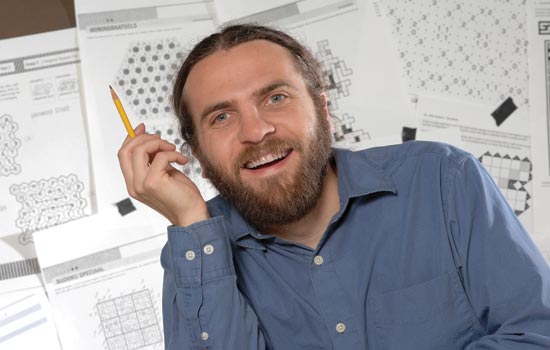RIT professor is master puzzle solver
A. Sue Weisler | photographer
Zack Butler, RIT assistant professor of computer science, has enjoyed great success as a member of the U.S. Puzzle Team.
Zack Butler received a big clue about his future when he got a voicemail message from Will Shortz in 1995. Shortz may not be a recognizable name to everyone, but in puzzle circles, The New York Times crosswords puzzle editor is a legend.
“Will was captain of the U.S. Puzzle Team,” says Butler, an RIT computer science professor. “He handpicked me to be one of the four members to represent the U.S. He was calling to confirm my plane reservations to Romania to compete in the World Finals.”
The U.S. team won that year and Butler finished fourth in the individual competition. This past October in Rio de Janeiro, Brazil, Butler and the other members of the U.S. team pulled it out again, earning its tenth team world title championship. The types of puzzles the teams solve range from Sudoku to mazes to visual logic puzzles.
From as far back as he can remember, Butler has been solving all kinds of puzzles. His mother competes every year in the American Crossword Puzzle Tournament and Butler accompanied her when he was 14.
“I remember I didn’t do very well in the crossword portion. We also did some word-play puzzles. I beat out almost everyone in the room. I was surprised.”
Butler’s skills at solving crosswords puzzles have greatly improved since he was a teenager. Out of a field of 400 crossword contenders, Butler finished in second place in the American Crossword Puzzle Tournament in 2002.
“I was fast and I didn’t make any mistakes.”
It’s customary practice for the top three players to finish the final round up on stage. Using large whiteboards, they solve the puzzles in front of a live audience.
“Each player wears headphones because while we are trying to complete the puzzles, announcers do play-by-play. ‘Butler is going for the row in the bottom left hand corner.’ It’s pretty cool.”
Butler is also a practicing cruciverbalist (one who writes crossword puzzles). It’s a sure bet he’s stumped a subscriber or two of The New York Times.
“Several of my crosswords have been published in the Tuesday and Thursday editions of the Times. Constructing crosswords helps me solve them faster. I write puzzles for the process because I think it’s fun.”
He likes to give his crosswords as gifts, with his wife and students often the receivers of his entries.
“I taught a robotics course in the spring and my students would come to class working on crossword puzzles, so I decided to write one for them with a robotics theme. My students know I’m the puzzle guy.”









